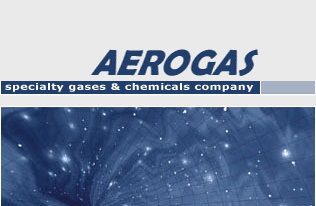| |
 |
 |
|
|
|
| Argon, Ar » |
 |
 |
| ARGON |
|
|
Name:
Symbol:
Atomic number:
Molecular weight:
Group name:
CAS Registry ID:
UN Number (gas):
UN Number (liquid): |
Argon
Ar
18
39.948 g/mol
Rare gas
7440-37-1
UN1006
UN1951 |
 |
Argon (Greek argos meaning "lazy")
terrestrially the most abundant and industrially the most frequently
used of the noble gases. Argon is used in the fanciest, most energy-efficient
double-pane insulated windowsis, in gas-filled electric light
bulbs, radio tubes, and Geiger counters. It also is widely utilized
as an inert atmosphere for arc-welding metals, such as aluminum
and stainless steel; for the production and fabrication of metals,
such as titanium, zirconium, and uranium; and for growing crystals
of semiconductors, such as silicon and germanium.
Typical Level of Impurities
| Oxygen |
O2 |
ppm |
1,0 |
| Moisture |
H20 |
ppm |
1,0 |
ARGON Liquid Purity 99,999 |
Ar |
% |
ppm |
| Hydrogen |
H2 |
ppm |
0,5 |
| Nitrogen |
N2 |
ppm |
5,0 |
| Oxygen |
O2 |
ppm |
2,0 |
| Moisture |
H20 |
ppm |
2,0 |
| |
m3
gas
15°C 1bar |
ltr.
liquid
TS 1,013 bar |
kg |
| m3 |
1 |
1,197 |
0,169 |
| ltr. |
0,8352 |
1 |
1,394 |
| kg |
0,5992 |
0,7174 |
1 |
Physical constants
| Chemical Formula |
Ar |
| Molecular weight |
39.948 |
| Denseness of gas at boiling point |
5,85 Kg/m3 |
| Denseness of gas at + 15°C |
1,67 kg/m3 |
| Temperature of boiling |
-268,8°C (4,2°K) |
| Denseness of a liquid |
1392.8 kg/m3 |
| Bottlenecks: |
|
| Temperature |
-122,3°C |
| Pressure |
48,98 bar |
| Denseness |
537,7 Kg/m3 |
Information about cylinders
| Type of cylinder |
Bulk, ltr. |
Type of a valves |
Operating pressures, bar |
Amount, ltr. |
| B50 |
50 |
DIN 477/6 |
140 |
10.000 |
Transport data
| Chemical Symbol |
Ar |
| CAS Registry ID |
7440-37-1 |
| DOT Classification |
Non-inflammable gas |
| DOT Label |
Non-inflammable gas |
| Hazard class |
2.2 |
| UN Number |
UN 1006 |
| Toxility (TLV) |
Non-toxic gas (asthma) |
| Range of Flammability (in an air) |
Non-inflammable gas |
| Odor |
Without an odor |
 |
|
| Xenon, Xe » |
| Krypton, Kr » |
| Neon, Ne » |
| Helium, He » |
| Laser Gas, XeNe » |
| Laser Gas, KrNe » |
| Laser Gas, ArXeNe » |
| Laser Gas, NeH2 » |
Excimer Laser Gases
XeCl, XeF, ArF, KrF » |
| |
| |
| |
 |

|
|
|















